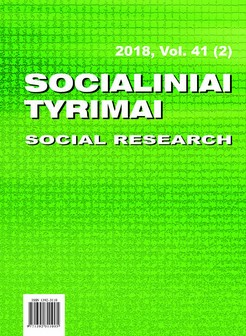Tardymo izoliatoriuje vykdomos resocializacijos veiksmingumas: kalinamųjų nuomonės tyrimas
The Effectiveness of Resocialization Carried out in the Interrogation Isolator from the Perspective of Convicts
Author(s): Laima Liukinevičienė, Donatas MikalauskasSubject(s): Behaviorism, Criminology, Demography and human biology, Penology, Penal Policy
Published by: Vilniaus Universiteto Leidykla
Keywords: social resocialization of convicts; social rehabilitation of convicts; imprisonment institution;
Summary/Abstract: In recent years, in the Lithuanian science (Sakalauskas, 2007–2017; Uscila, 2012, 2015; Vaičiūnienė, 2017, etc.) and in the policy of custodial sentences, in terms of convicts’ social integration into society, in addition to the concept social rehabilitation, a wider term resocialization is used, as well as the differences between these concepts are perceived. Resocialization covers a wider context, and a number of assumptions determine the success of the resocialization of a convict in the imprisonment institutions. The implementation of resocialization requires not only the material and human resources of statutory institutions. In order to succeed in integrating a person into the society, a personalized access, the motivation of a convicted person himself/herself to change his/her behaviour have become important, the forces of enforcement authorities, the society (NGOs, volunteers, etc.), the continuing assistance to the person upon his/her release have been concentrated. Lithuania is taking the first steps in systematically managing the resocialization of imprisoned persons. Institutions of imprisonment face major challenges, because the successful rehabilitation of convicts requires the creation of appropriate conditions (close to life under release), to have the competent staff capable to identify the most serious motives of an offender and to individualize their needs to change, to have well-thought out programs of social adaptation, employment, etc., for whose implementation it is necessary to attract more people. Large public funds imply the need to assess whether the process of resocialization is effective. Summarizing the indicators which are currently used in imprisonment institutions and discussed by scholars as inadequate for assessing the effectiveness of resocialization (reduction of crime recidivism, the number of social rehabilitation programs and the number of convicts involved in them, the number of employees who acquired the competences necessary for the implementation of social rehabilitation process, etc.), the question is raised how to objectively evaluate the effectiveness of resocialization. Having found that the researchers (Schapland, Bottoms, Farrall, McNeill, Priede, Robinson, 2012) of the countries (Germany, England, the USA), which have best practices in the resocialization of convicts, advocate the use of subjective research in assessing the effectiveness of the resocialization process in imprisonment institutions, the survey was carried out in Šiauliai Interrogation Isolator to assess the effectiveness of the process of the social integration of convicts into society (the purpose of resocialization). For the survey carried out at the beginning of 2017, 397 men and women, who were imprisoned in Šiauliai Interrogation Isolator (hereinafter ŠII, the Isolator), were selected as the respondents. Answers to questions were provided by 279 respondents. The content of the quantitative research was expressed in five main thematic groups of questions: demographic, the evaluation of the activities of the Isolator social rehabilitation specialists, the change of services provided by an organization and their management, the efficiency of resocialization and social rehabilitation, and the influence of the environment on the convict’s resocialization.
Journal: Socialiniai tyrimai
- Issue Year: 41/2018
- Issue No: 2
- Page Range: 18-31
- Page Count: 14
- Language: Lithuanian

